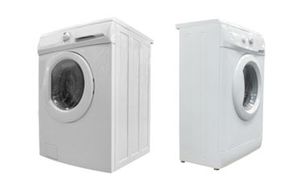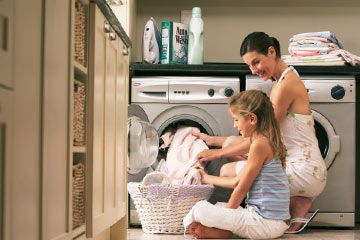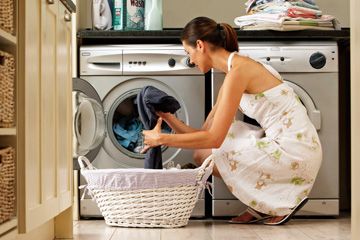Let's do a little math. An average person uses between 80 and 100 gallons of water per day. Taking into consideration some shared usage, that's about 300 gallons of water per family of four each day. Multiply that by 365 days and what do you get? A whole lot of water (try 109,500 gallons). Those same households do approximately 400 loads of laundry each year or use approximately 15 percent of that water on washing clothes for about 16,000 gallons. Now, what if you could cut that consumption by up to 40 percent? For one, you'd save some serious coin. Believe it or not, with a low-water washing machine, you can reduce the amount of water you consume.
Once upon a time, the standard washing machine consisted of large porcelain or plastic basket inside a sealed drum that would fill almost completely with water. A 3.0 cubic foot drum can hold 22.4 gallons of water. With a wash and rinse cycle, washing machines can use up to 50 gallons of water per load in larger machines. In recent years, low-water washing machines also known as high efficiency (HE) machines have changed the game, using on average, 40 percent less water. One such machine, built by British company Xeros, uses special pellets for cleaning and is touted as virtually waterless. Think dry cleaning for the home.
Advertisement
Have you ever seen an Energy Star label on an appliance? Energy Star products must meet certain energy-saving criteria to earn that label. For washing machines, one of those criteria is low water usage known as the machine's water factor (WF). Water factor is derived by taking the total weighted per-cycle water consumption (the quotient or Q) and dividing it by the washer's capacity (C). As of July 1, 2009, washing machines seeking an Energy Star label must have a WF less than or equal to 7.5. In 2011, that number drops to 6.0 (the lower the number, the less water used).
Low-water HE machines pull this off because of the technological advancements made over the past decade or so. Unlike a conventional washer, where you choose a water setting based on load size, with an HE machine, the clothes soak up the water and sensors detect how much water is needed based on weight and moisture level. The machine uses only sufficient water to get the clothes wet enough to wash.
Front load machines (which resemble the ones you see in Laundromats with round glass doors in front) aren't the only option. Turn the page to learn more about top loaders and check out the benefits of each.
Advertisement



